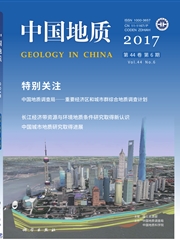

 中文摘要:
中文摘要:
旌德花岗质杂岩体位于安徽南部,由花岗闪长岩和二长花岗岩组成.本研究得到岩体中锆石U-Pb年龄为(141.0±1.0) Ma,认为该年龄代表岩体的侵位年龄.岩体全岩主量元素特征显示出中偏酸性(SiO2=66.01%~70.87%),富Al (Al2O3=14.91%~16.24%),富碱(alk=6.64%~8.01%),K2O/Na2O变化范围在0.78~1.04,镁、铁含量较低,MgO:0.68%~1.06%,TFe2O3(2.0%~3.34%),以及低磷(P2O5 =0.10%~0.14%)的特点;微量元素主要富集Sr (189×10-6~452×10-6),贫Nb、Ta、P、Ti、Y、Yb,高Sr/Y比值(23~66)和(La/Yb)N (13~58),Eu有轻微的负异常到弱的正异常(δEu=0.81~1.18).旌德岩体的地球化学特征与中国东部中生代埃达克质岩相似.ISr=0.7096~0.7101,εHf(t)=-6.28~-7.32,εHf(t)值变化于-6.5~-1.1,两阶段模式年龄tDM2=1.4~1.5 Ga.较年轻的Nd同位素模式年龄、较高的ε Nd(t)值和εHft)值,以及岩体中发育有岩浆混合成因的暗色包体,指示源区可能有地幔物质的贡献.幔源岩浆底侵使下地壳发生部分熔融,并发生了岩浆混合作用,形成了旌德岩体.
 英文摘要:
英文摘要:
Jingde pluton is one of the Mesozoic plutons in eastern Jiangnan orogen of northeast Yangzte Block. New LA-ICPMS zircon U-Pb dating for one granodiorite yielded an emplacement age of (141.04-1.0) Ma. The pluton is composed of monzogranite and granodiorite. New petrographical and petrochemical data show that the pluton is intermediate-somewhat acid (SIO2=66.01%~70.87%), and has high content of A1203 (A1203=14.91%~ 16.24%) and rich alkali (K20+Na20 = 6.64%~8.01% ), with K20/Na20 value ranging from 0.78 to 1.04. The pluton has relatively low content of MgO, TFe203 and P205 (MgO = 0.68%~1.06%, TFe203=2.0%~3.34%, P2Os = 0.10~"0.14% ). As for trace elements, the pluton is enriched in Sr (189x10-6~452x10-6) with high Sr/Y ratios (23~66) and also enriched in light rare earth elements (LREE) ((La/Yb)N = 13 -58) , but somewhat depleted in Nb, Ta, P, Ti, Y, Yb, with slightly negligible to positive Eu anomalies (δ Eu =0.81 -1.18), similar to the geochemical characteristics of Mesozoic adakitoid in eastern China. Jingde pluton has relatively high Nd isotopes ( δ(t)=-6.28~-7.32), high e δ (t) values (-6.5-1.1) and younger tDM2 model ages (1.4--1.5Ga), with mafic microgranular enclaves (MMEs), suggesting the importance of mantle material in the magma source. The mafic magmas ascended and heated the lower crust, triggering the partial melting of the lower crust to form the Jingde pluton, with the input of mantle-derived materials.
 同期刊论文项目
同期刊论文项目
 同项目期刊论文
同项目期刊论文
 期刊信息
期刊信息
